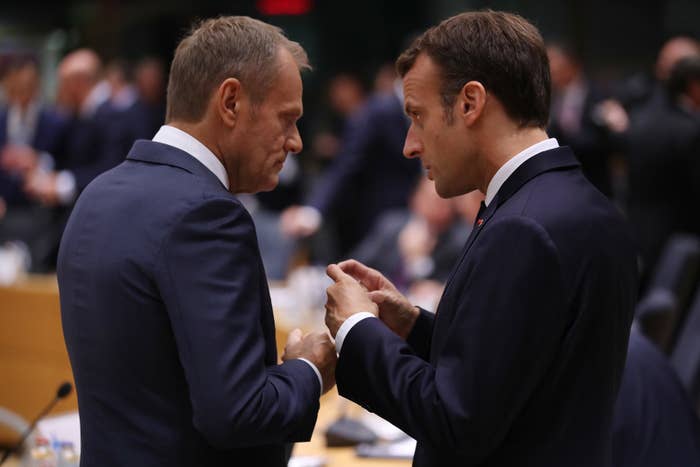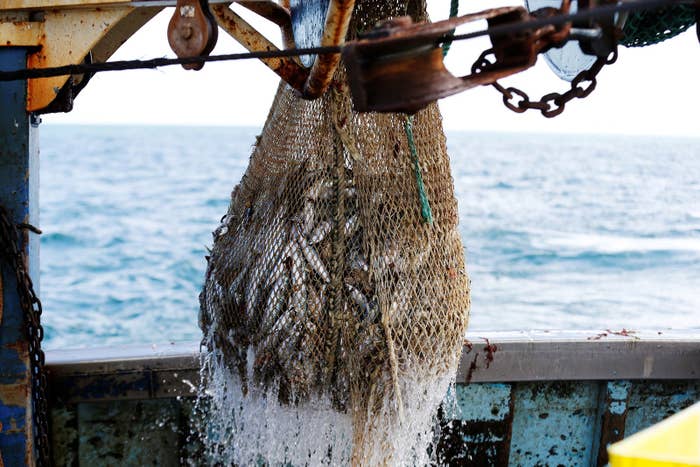
Officials from the European Union’s remaining 27 states have raised specific concerns about the draft Brexit agreement agreed this week, according to diplomatic notes seen by BuzzFeed News from meetings that took place in Brussels on Thursday and Friday.
As Theresa May faced a government crisis and a standoff with members of her own party in London, experts and diplomats from the EU27 expressed their own concerns about extending the transition period beyond 2020 and how to calculate the amount of money the UK should pay the EU in that eventuality. They also raised the issue of continued fishing rights in UK waters, and UK–EU customs arrangements.
Europe’s capitals have officially welcomed the overall deal after months of fraught negotiations. At a meeting on Friday morning, EU27 ambassadors were keen to “not rock the boat”.
“The vibe in the room was positive,” one diplomat told colleagues.
However, the notes shared with BuzzFeed News reveal that the question marks over the details of the agreement are not just on the British side.
Spain, France, and Belgium were among governments to ask the European Commission at a working group of experts for greater clarity on the terms under which an extension of the transition, currently planned to last until the end of 2020, would be agreed and how exactly the UK would pay for it.
According to the draft deal agreed by the UK and the EU, prolonging the transition would be a joint decision, and the two sides would need to come to an agreement on the UK’s continued financial contributions to cover the additional time.
Without an agreement on the financial contribution there will be no extension of the transition, according to one of the notes seen by BuzzFeed News. At the meeting, the Commission also explained that the transition could be extended once to an agreed date, and that both the UK and the EU could request an extension.
In her public statements about the arrangement so far, Theresa May has focused on the fact that the UK can request an extension, without mentioning that the EU could too.
The German government representative asked that the conditions be clarified in greater detail before EU leaders meet next Sunday to sign off on the deal, the note states.
A longer transition is one of the possible options set out in the draft agreement as part of the architecture of the so-called backstop, an insurance policy to avoid a hard border between Northern Ireland and the Republic of Ireland under all circumstances.
Should a trade deal that avoids a hard border not be agreed by July 2020, another option would see the UK enter into a customs territory with the EU, and would require the UK to remain aligned to EU competition, state aid, and tax rules. As part of the backstop, Northern Ireland would remain in the EU’s regulatory space for goods, as a customs union alone would not guarantee frictionless trade.
EU diplomats were clearly told at this week’s meetings that neither side wanted to use the backstop, and the likelihood of it ever being used was not high.
But without a trade deal that solves the border issue or a joint decision to extend the transition, the backstop would kick in automatically.
A number of European governments, including France, asked for clarity on how the UK would dynamically align to EU rules years from now, and for assurances that the UK would not be able to undermine the EU in areas such as agriculture as it signed its own free trade deals with non-EU countries in future.
The European Commission noted that as part of the backstop agreement, the UK would need to align its tariffs to the EU’s, could not introduce lower tariffs under any circumstances, and was obliged to follow EU rules and standards on state aid and competition, as well as some tax-related issues.
The EU would have instruments at its disposal, including the imposition of tariffs, should the UK not comply with its obligations.
But the hottest issue for many governments is the lack of an agreement on fishing rights in UK waters. British negotiators have demanded that the issue be excluded from the backstop and the withdrawal agreement, committing only for it to be part of negotiations about the future.

May is under intense pressure from her own MPs not to give ground on this issue. All 13 Scottish Tories, including Scottish secretary David Mundell, signed a letter to the prime minister ahead of Wednesday’s crunch cabinet meeting on the deal warning that they would vote against any arrangement that tied the UK’s hands on fishing rights.
A number of EU governments feel that a promise to negotiate about it doesn’t provide the required legal clout, the notes reveal.
During Thursday’s working group, French representatives noted that granting the UK access to the single market through the backstop without Britain reciprocating access to its waters in return was a problem for France.
Spain, Belgium, Ireland, Portugal, and Denmark also raised similar concerns, asking for greater clarity on how the British carveout for fish would work in practice, and how their respective industries would be protected should the backstop arrangements kick in.
The Commission explained that the July 2020 date — set out in the withdrawal agreement as the moment to take stock of the status of trade talks — was important as it was when the member states themselves would start discussing future fishing quotas.
Several governments also asked for further details on how social security systems would be coordinated after Brexit, and on the overall governance of the agreement, including dispute settlement mechanisms.
EU and UK negotiators will only have a few days to iron out all these wrinkles.
According to the note of Friday’s meeting, ambassadors of the 27 member states will meet again on Sunday to go over the withdrawal agreement, while a beefed-up version of the political declaration outlining the future UK–EU relationship is due early next week.
The president of the European Council, Donald Tusk, has strongly indicated that the Nov. 25 summit should not be a drafting session, but simply the opportunity to endorse the agreement, the note says.
The European Commission declined to comment.
